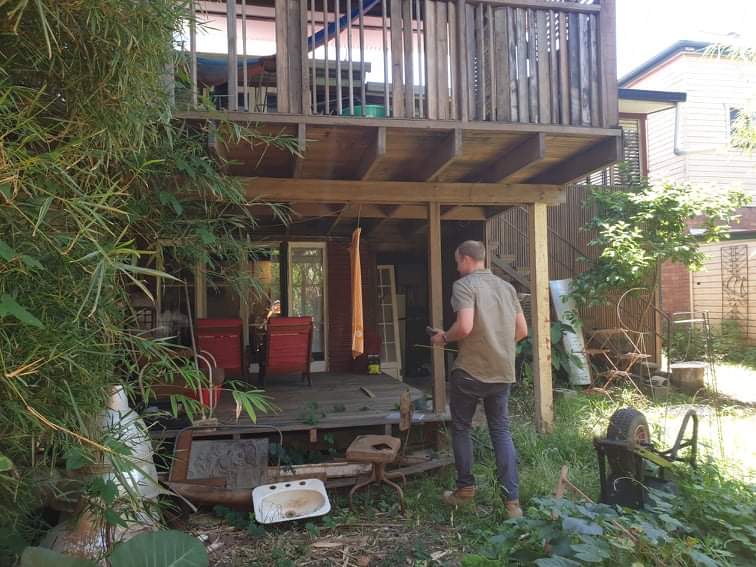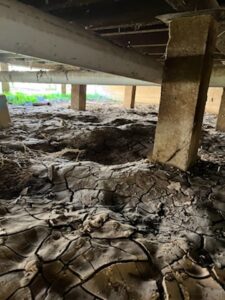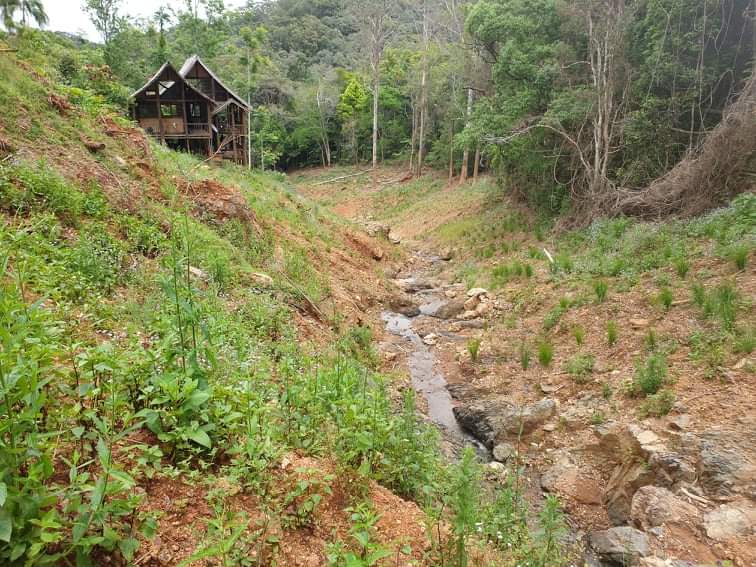Pictured: A severe slip in the region is slowly being revegetated, with debris flow assessment and analysis required to inform future inundation heights and suitability of potential remedial options
A year after the floods that devastated communities in the Northern Rivers region, Engineers Without Borders Australia (EWB) and local community partner Holding Hands Under Ground (HHUG) have been coordinating volunteers to respond to community needs. In doing so, EWB has been piloting a recovery response model that can be mobilised across other regions during future climate disasters, to support low-income and marginalised communities.
The Northern Rivers Flood Recovery Engineering Support project has been addressing the problem of extensive infrastructure (including private roads, causeways and land) damage and delays in remediation caused by river flooding and landslides in Australia. HHUG has been coordinating operations on the ground, with a highly passionate and skilled team of volunteers who connect with dozens of other community and stakeholder groups, and hundreds of volunteers to service thousands of people across a broad range of community members impacted by the floods. EWB is leading the engineering response, engaging individual engineer professionals as well as employees from pro bono engineering firms Arup and Douglas Partners, who are each volunteering their expertise to provide engineering planning services, including geotechnical and structural assessments to affected communities.
The project objectives
- Assist flood-affected communities with access to engineering services to support their individual recovery needs: The core focus of the project – to provide technical support and expertise to help communities expedite the process of repairing and restoring infrastructure and land that has been damaged by floods.
- Prioritise community-led recovery and meeting the needs of vulnerable community members: working alongside community organisation HHUG which recognises the value of community-led recovery and the importance of connecting with community members to understand and address their needs.
- Develop and deliver options reports for each affected community: For community members that submit support requests, engineers conduct site visits, preliminary scoping, and assessments (including geotechnical and structural assessments) to develop options reports for each affected community member. The options reports support communities to make informed decisions about how to repair and restore their infrastructure.
The work done thus far
EWB’s engineering volunteers have spent the past six months conducting site visits, scope management plans and options reports for community members that submitted support requests. We are still continuing this work. These reports provide detailed information about the condition of the affected infrastructure, potential repair and restoration options, and estimated costs. For some affected residents, the provision of these reports will allow them to provide evidence to their local councils, so they are legally able to return home. For others, these reports will provide them the information they need to support their decision-making and empower them to take their best next steps for their recovery. Technical support is also provided to the communities and community members are engaged to ensure that the project is meeting their needs. This project is essential in expediting the repair and restoration process, and to reduce the prolonged delays that communities are currently experiencing – improving the lives of residents, increasing economic stability, and improving public safety.

Sam inspects a house in Lismore that is cracking around the window frames after surviving 500mm of water above the second floor.
The impact
As of March 2023, EWB and HHUG has delivered the following:
- Over 100 requests for assistance answered
- 30+ volunteer engineers deployed or undergoing pre-deployment training
- All initial inspections completed with 47 sites pending detailed site inspections, including additional testing.
- Over 220 beneficiaries to be expected from actions on 41 currently completed Options reports
- Estimated provision of over $320,000 worth of engineering expertise thus far, at no charge
Having EWB on the ground has not only been key in delivering the engineering support that is needed. “It has also been good for community morale,” reflected HHUG Co-Directors, Ella Rose Goninan and Luke Jaaniste. “This extended to residents who didn’t require support from EWB. Community members have felt that EWB’s presence has added a ‘glow to a difficult time’. We sometimes don’t recognise the ripple effect of good feeling that’s generated by simply being present. There is huge appreciation that HHUG are connecting and coordinating with EWB to provide support. Through our work together, we are connecting to stories of care and inspiring caring communities.” Community support has also extended to local hosts who have been generous in providing accommodation to some of our volunteers.

The result of severe flooding to house footings.
What’s next
EWB is completing the next stage of works which focuses on geotechnical engineering that requires additional equipment onsite. In the coming months, a full evaluation of the project will also be conducted so that EWB can assess outcomes that will feed into a wholly realised, evidence-led model – ready to be actioned when such disasters occur in the future and require speedy deployment of specialised engineering support.
With gratitude
As a volunteer-led response, EWB wished to thank the following people who have volunteered their time and applied their deep expertise so that low-income and marginalised communities have been able to receive the support they need: Dominic Cavanough (Engineering Project Lead), Sam Burton, Tim Kelly, Mike Punch, Chris Tanner, Gavin Blakely, Bea Duffield, Tim Anderson, Andrew Middleton, Shannon Davies, Tim Mote, Daniel De Cataldo, Dennis Gunaseelan, Maria Juliana Ñungo Casallas, Andrés Alberto Sebastián Riffo and the following Engineering Admin Support volunteers: Tuan Dung (Ivan) Pham, Hamideh Talebi, Kara Trimpin, Ayden Cleghorn and a huge thank you to our community hosts, Rosslyn Jane Meltzer, Suzanne Craig and Louise Gordon for billeting our deployed volunteers and many others who are currently supporting this project behind the scenes. Thank you!
What you can do
We are seeking volunteers to liaise with community members as Stakeholder Engagement Officers to support residents with any enquiries relating to their final reports as well as gather community feedback to ensure communities are receiving appropriate and relevant support from EWB. If you would be interested in supporting this project as a Stakeholder Engagement Officer, please contact EWB Project Lead, Farhiyo Bear, f.bear@ewb.org.au.
Our next stage involves geotechnical testing of sites for community members. With the support of Douglas Partners, our Pro bono Partner, we hope to provide communities access to geotechnical expertise valued at over $60k. We have the team, however we need your support to fund up to $10k so that we can hire an excavator and insured operator to support onsite testing for these communities. If you’d like to donate, please donate here – your donation will directly impact and support the recovery of flood affected community members in Northern Rivers.


